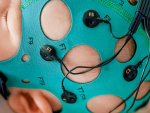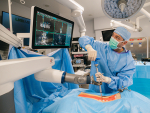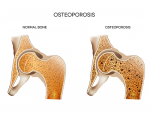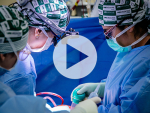Displaying items by tag: school of medicine
The M.D./Ph.D. student has since moved on to clinical studies, but the research into possible drugs to treat Alzheimer’s disease continues.
Tagged under
Ovarian cancer is known as the “silent killer” due to the difficulty in early detection because most women do not have any early symptoms.
Tagged under
The modified mRNA — delivered after experimental heart attacks — transiently allows heart muscle cells to proliferate, leading to reduced infarct size and improved heart performance compared to untreated animals.
While preventive treatment with vigabatrin delayed the onset and prevalence of infantile spasms in TSC infants, it had no impact on focal seizures, drug-resistant epilepsy, or improvement of cognitive and behavioral scores at 24 months.
Tagged under
UAB researchers make a case for utilizing telehealth technologies in the care of injured rural patients stating that teletrauma can improve access to trauma care for rural patients.
Tagged under
The study’s findings provide valuable insights into the role of diet composition in Type 2 diabetes management.
Tagged under
Rachel Smith, Ph.D., professor in the UAB School of Engineering and principal investigator in the Neural Signal Processing and Modeling lab, was recently awarded multiple grants to fund research in seizure onset localization.
Tagged under
Undergoing surgery can be a highly stressful time for patients and families. Surgeons at UAB work with a team of health care providers to guide patients through the surgery process and provide high-quality, personalized care.
Tagged under
Since 1985, the Coronary Artery Risk Development in Young Adults study has examined the factors that contribute to the development of cardiovascular disease to better understand the natural history of cardiovascular disease over the adult life course.
Tagged under
These results add an additional, mechanistic aspect to further explain how the decades-old blood pressure medication verapamil can preserve beta cell function in Type 1 diabetes patients by affecting the hormone insulin-like growth factor 1.
Tagged under
Tagged under
This is the first direct evidence that resident microbiota can have a significant impact on the establishment and pathology of infection by two different human-specific pathogens.
Tagged under
Tagged under
TCE is a known environmental risk factor for parkinsonism. UAB researchers will evaluate whether T cell activation caused by TCE exposure leads to cognitive decline.
Tagged under
The study, funded by the Patient-Centered Outcomes Research Institute, will compare two pathways of post-fracture patient care.
Tagged under
Some individuals may experience a range of somatic or physical symptoms, such as persistent tension or nervousness, as the weekend comes to an end, also known as the “Monday blues” or “Sunday scaries.”
The project will empower a wide range of users to implement the next generation of genomic analysis, smart querying of medical literature, neuro-symbolic AI with stochastic reasoning, graph analytics, software verification tasks and security auditing.
Tagged under
The new treatment involves using a spinal cord stimulator that sends electrical impulses into the spinal cord. The device responds to the spinal cord in real time and can adjust the electrical output 50-100 times per second based on what is happening in the spinal cord.
Tagged under
This study, performed in a pre-clinical human model, is the first time xenotransplanted pig kidneys have shown clearance of creatinine and shown a standard immunosuppression regimen may be sufficient.
Tagged under



















